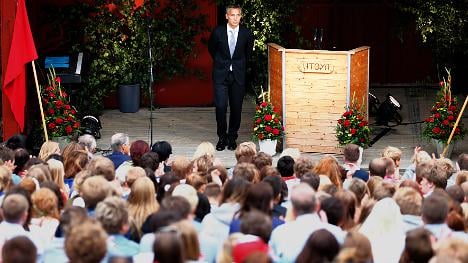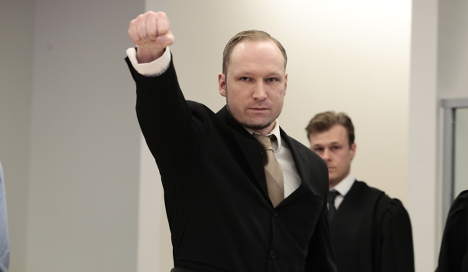"Even though we carry a heavy burden, we are still standing," said the head of the Labour Party youth wing Eskil Pedersen on the anniversary of the atrocity that stunned the usually tranquil nation.
"He took some of our loveliest roses, but he could not stop the springtime," Pedersen said at Utøya, where Breivik gunned down 69 people.
He was speaking to around 1,000 Labour Party youths — several of them survivors of the bloodbath — who were gathered on a lawn along with Prime Minister Jens Stoltenberg and other top political officials.
Pedersen himself escaped the gunman's bullet at the start of the massacre.
"Even after a year, it is barely possible to measure the suffering and fear that seized Utøya last July 22nd," Stoltenberg said at the ceremony that began with a minute of silence and two songs by a survivor who saw her boyfriend killed.
The Labour prime minister will meet family members of Breivik's victims and lay a second wreath on the heart-shaped island at 6.45pm, almost exactly the time that Breivik was finally arrested after his more than hour-long shooting spree.
"We stuck together at the most difficult time our generation has ever experienced. Today as well, take care of one another," survivor Adrian Pracon said in a tweet.
"Mixed feelings but we will have a good day and remember those who never went home. It'll do us good," tweeted another, Marte Ødegården.
Breivik's rampage began in Oslo, where he set off a massive bomb outside the main government building, killing eight.
"The bomb and bullets were aimed at changing Norway," Stoltenberg said earlier. "The Norwegian people responded by embracing our values. The killer failed, the people won."
The extremist, now 33, said he carried out the attacks to protect his country against "the Muslim invasion" and said he had targeted the Labour Party for its immigration policies and support for a multicultural society.
US Secretary of State Hillary Clinton sent a message of sympathy to the Norwegian people for this "enormous tragedy".
Breivik, whose 10-week trial ended last month, is awaiting his verdict, expected on August 24th.
While there is no doubt he carried out the attacks, the five Oslo court judges must decide whether he should be considered criminally sane and sentenced to prison, as requested by his defence, or instead follow the prosecution's line and send him to a closed psychiatric ward.
The Labour prime minister, who was at his official residence and not in his office in the 17-storey main building at the time, began Sunday's commemorations by laying a wreath near the spot where the bomb went off.
The streets around the government complex reopened only last week after the removal of more than 4,300 tonnes of rubble, at a cost of more than 300 million kroner ($48 million).
Stoltenberg attended many of the most heart-wrenching events commemorating the worst atrocity carried out on Norwegian soil since World War II.
Norway's king and queen joined him at a service at Oslo's cathedral, where hundreds of people were gathered outside, laying heaps of roses — the Labour Party symbol — as they did in the weeks after the attacks.
"Know that we miss you," Pedersen said there. "Today, we honour you. Tomorrow a new day begins. We must go forward — not without sadness, not without pain, but together we will make it."
Stoltenberg is also set to attend a commemorative concert outside Oslo city hall featuring mainly Norwegian musicians and possibly Bruce Springsteen.
Norwegian folk singer Lillebjørn Nilsen, who in April led some 40,000 rose-waving protesters to sing a song derided by Breivik, will also perform.
Norway's professional football teams observed a minute of silence before all games played on Sunday.



 Please whitelist us to continue reading.
Please whitelist us to continue reading.
Member comments